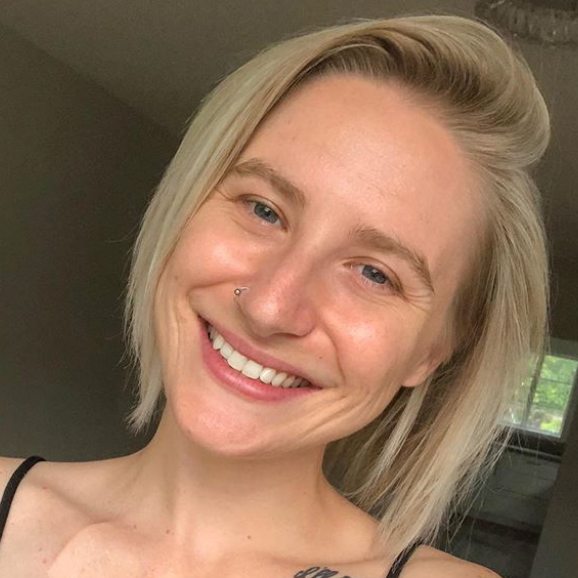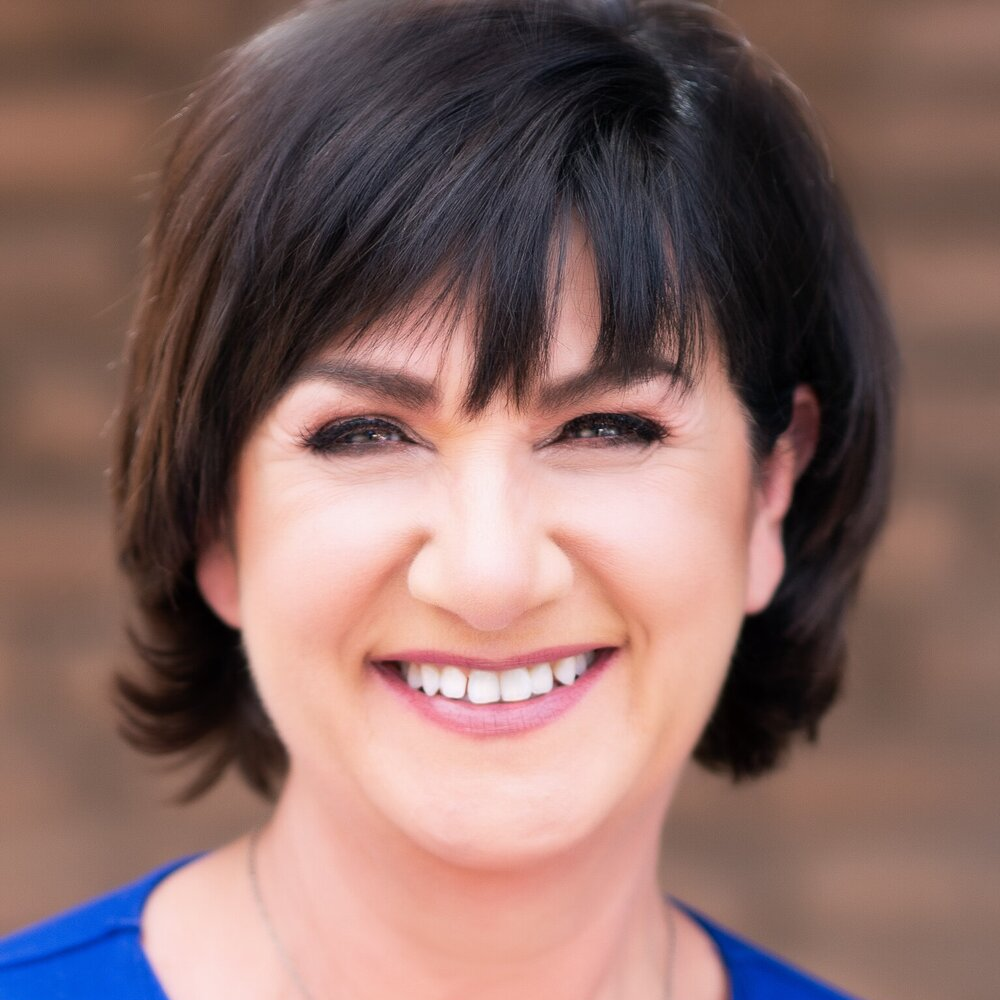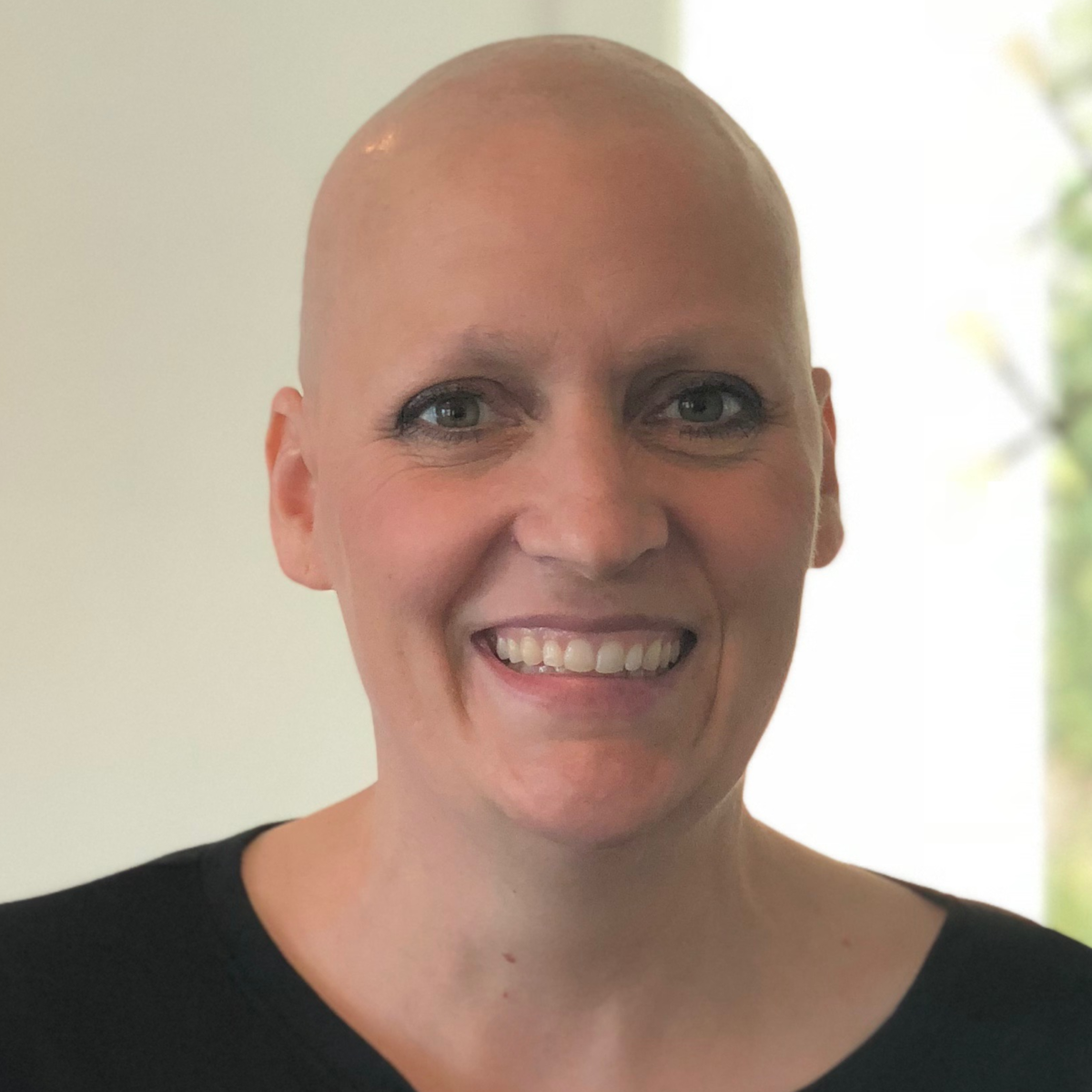Tiffany’s Stage 3A Ovarian Cancer Story
Interviewed by: Taylor Scheib
Edited by: Chris Sanchez

33 year-old Tiffany is undergoing treatment for stage 3A ovarian cancer.
Tiffany was about to embark on a yearlong trip when she received life-altering news, a cancer diagnosis. Her diagnosis not only forced her to postpone her trip, but also convinced her to undergo IVF egg retrieval in order to preserve her ability to have children later on.
Tiffany is in the midst of her ovarian cancer treatment and, as of her interview, was steeling herself to undergo major surgery. But she has many reasons to be positive about her future. She shares her story with us to help others in the same situation.
In addition to Tiffany’s narrative, The Patient Story offers a diverse collection of stories about ovarian cancer. These empowering stories provide real-life experiences, valuable insights, and perspectives on symptoms, diagnosis, and treatment options for cancer.
- Name: Tiffany L.
- Diagnosis:
- Ovarian cancer
- Staging:
- Stage 3A
- Initial Symptoms:
- Severe bleeding after insertion of IUD
- Discomfort and pain after working out
- Treatment:
- Chemotherapy: Carboplatin and Taxol
- Surgery: Total hysterectomy
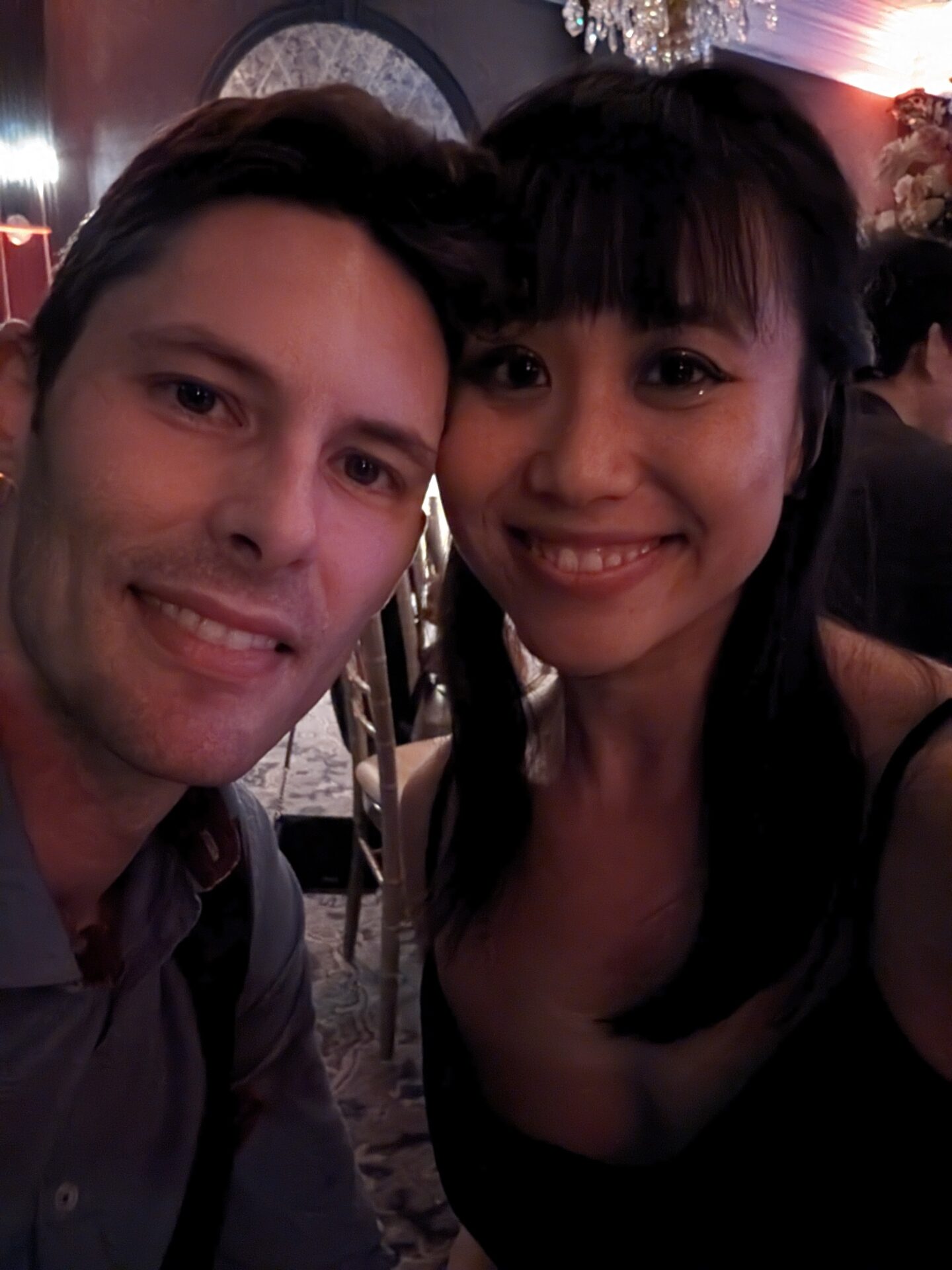
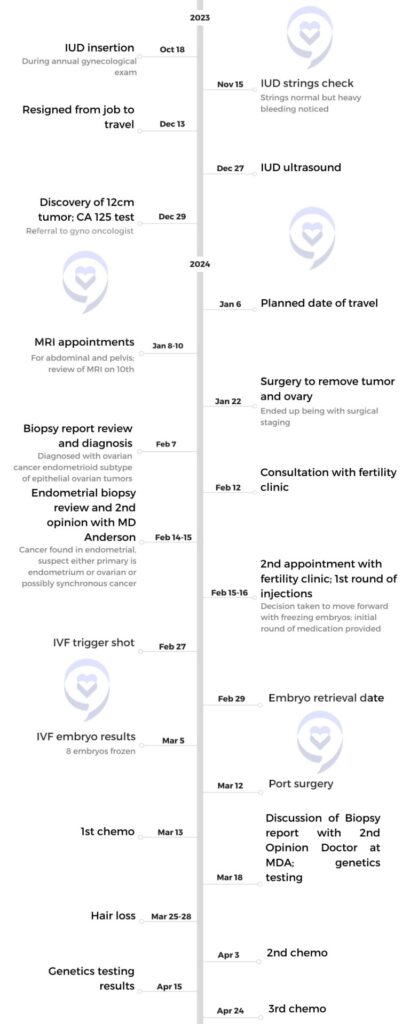
This interview has been edited for clarity. This is not medical advice. Please consult with your healthcare provider for treatment decisions.
My biggest advice is to be really honest with yourself first.
Like, really checking in, are you feeling something or not?
Introduction
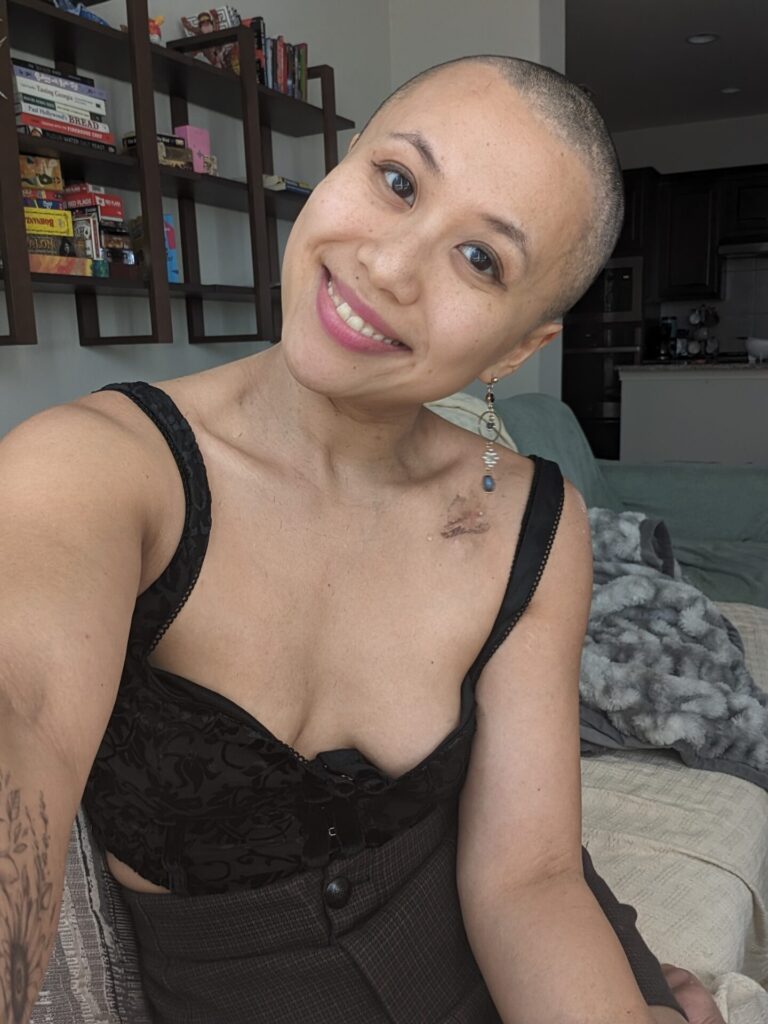
My name is Tiffany. I’m based in Austin, Texas. I’m 33 years old.
I love pole dancing, contortion, and I’m learning how to draw for fun, as well as watercolor in my free time.
I’ve been diagnosed with ovarian cancer, stage 3A.
Discovery and diagnosis
I was supposed to go travel abroad for a year in 2024, and was supposed to leave the first weekend of January. Didn’t want to carry a year’s supply of birth control with me, so I decided to get an IUD.
I had an annual exam at the gynecologist, just standard stuff, and then that was when I mentioned an IUD, and so we got that inserted. We did the normal stuff that you would do during the annual exam. The gynecologist didn’t find anything weird then.
At first, the IUD was fine, it wasn’t too painful or anything. About a week after it was inserted, I started bleeding like crazy.
I had my strings checked a month later, and that was okay, too, but I was bleeding a lot. It was like I was soaking through a heavy pad every hour or so. And so I just left it because it went away eventually.
But a couple weeks after the string check, I started bleeding a lot again, and I didn’t really stop bleeding until they took it out. I was having heavy bleeding, and then it would it would kind of slow down a bit.
It just went on for weeks. So that’s why I called them to double check to make sure it was okay.
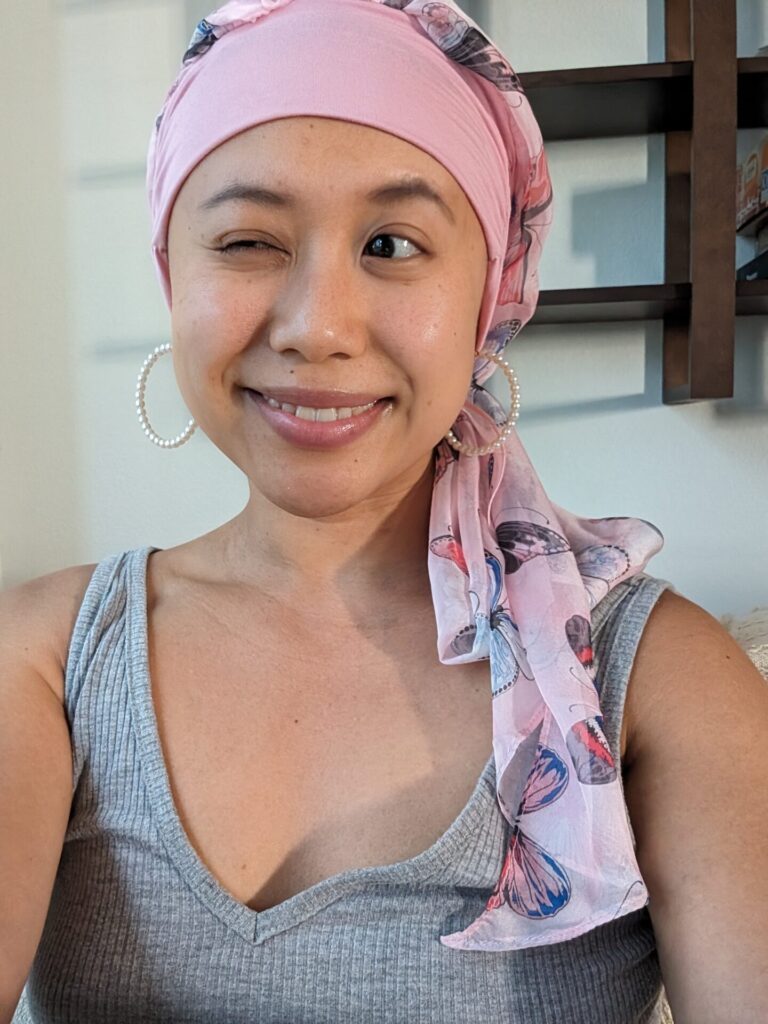
I called them probably mid December or so. Because usually what happens is like, you call them and they just tell you, oh, it’s normal. It’s an adjustment period for the IUD, you’ll be okay. But I’m leaving in a few weeks. I need you to make sure this is okay before I go abroad.
So finally, they got back to me and they’re like, okay, we’re gonna do an ultrasound to check. I remember going in, I was like, I’m pretty sure this IUD is misplaced. I remember the sonographer going through everything. And then I looked at the screen and I saw this huge hole.
I can’t read the graphics, but I saw her face and I was like, what is going on? I’m pretty sure there’s something more than just this IUD problem. But she’s not able to tell me what’s happening because I don’t think she’s allowed to by law.
I almost was able to talk to the doctor right away, but then I actually had a work meeting, so I had to schedule it for I think the next day or something. I was just really anxious for 24 hours or so. And then the next day I went in and the doctor was like, hey, look, we found a gigantic cyst.
We don’t know what it is, the doctor said. I’m going to need to refer you to a gyno oncologist. Like I’m supposed to leave next week. Can I get an appointment right away? And she’s like, yeah, I’m gonna try to see if we can bump you up. And then she ran this blood test for the tumor marker, CA 125, that same day. So the new doctor can get all the results and stuff.
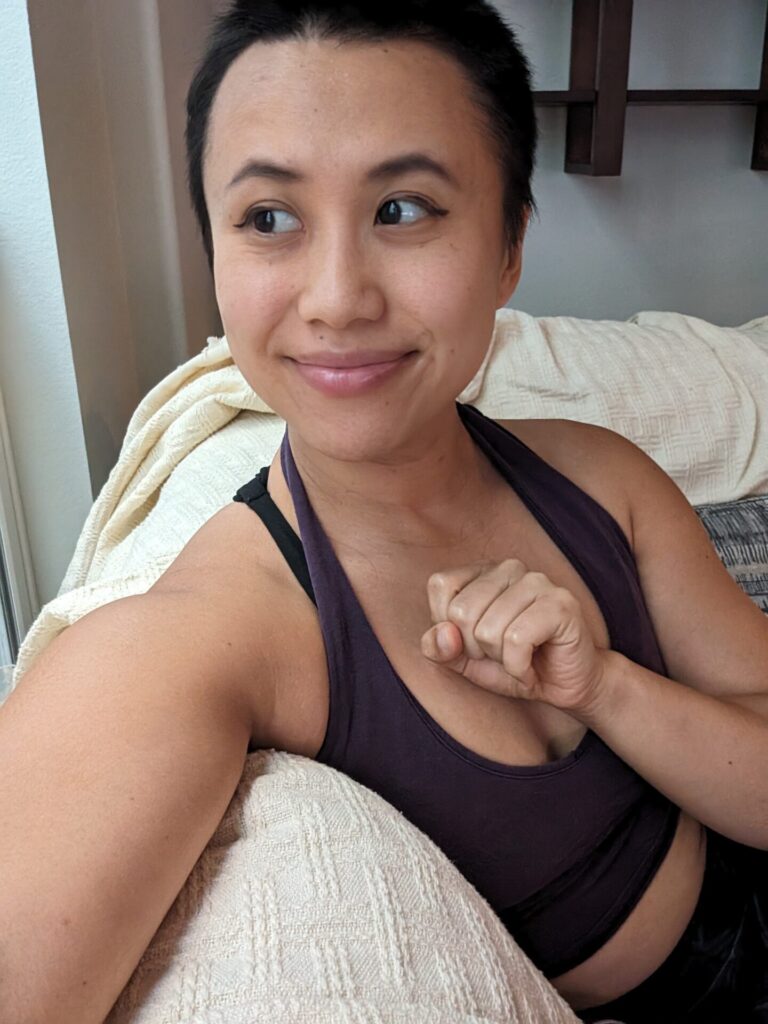
So I had an appointment I think the next week, right before I was supposed to leave. I was like, well, there’s a huge thing in me, regardless of it being cancer or not, I need to take this out. So I probably do have to postpone my trip. There’s no way, you know, this person can just take it out in a week. So, yeah, I postponed my trip.
In my head I was like, okay, maybe it’s just postponed for a few weeks or a month. Maybe I can head out in February or something, which is not a big deal. But by that time, I had already quit my job because that was the plan.
My last day of work was right before I was supposed to leave. It it just put me in a weird position because, I was like, well, I might leave soon anyway, so I guess it’s just like a month, I don’t need to get my job back. So I didn’t really bother with it. But also, it was just like a strange, in-between time where everything was up in the air.
So I went to the new doctor, the gyno oncologist. And she basically was like, I need to see an MRI. So I had to get that done the next week.
And then after that, the follow up appointment, she didn’t really say it was cancer or anything, actually, even though my blood work was over the chart, my CA 125 was like 4000 and the standard was like 35. So it was crazy high. But, different things can affect your CA 125, such as endometriosis, which I wasn’t diagnosed with. All I knew was that I had PCOS. [Polycystic ovary syndrome (PCOS) is a hormonal disorder in reproductive-age women, causing infrequent or prolonged periods and elevated androgen levels.]
So when I talked to her after the MRI, she wasn’t definitive that it was cancer, but she wasn’t saying that it wasn’t either, because they don’t really tell you until they really go in there anyways. So she basically she knew that she had to take out the ovary that was attached to the tumor. But she asked me, if it’s cancer, what are your thoughts about having kids? Um, because if it’s cancer, usually they take everything out.
It took me a few days to get back to her because it was just so shocking to think about. We ended up deciding that we would keep the other ovary in there, even if it’s cancer, because we wanted to preserve my fertility and see if we could go through the IVF route.
Going into surgery, the doctor thought it’s probably borderline because it’s rare that someone in their 30s would have ovarian cancer. But, I mean, it could happen. She said that if it is borderline, then I probably wouldn’t need chemo. It ended up not being borderline.
What happened during surgery is that she took the tumor out with the ovary, and she said the tumor was hard to take out. It wasn’t like a solid tumor, where, she could just pick it up with the robot and take it away. It was mushy and weird, gross-sounding.
The surgery took five hours, I believe, which was way longer than I expected because, besides taking it out, she also had to wait for a biopsy to see if it’s cancer and then after it’s cancerous, she does surgical staging. So she would swipe samples of different areas of my pelvis. I think it was bladder, bowels, uterus.
She took the omentum out for biopsy to see if there’s any cancer cells there. So that’s also probably why it took five hours. I took up pretty much the rest of her afternoon, so I didn’t really see her until the next day. And that’s when she told me that, hey, it is cancer.
But we didn’t know the staging; we just know that it’s probably more than likely, more than stage two, based on what I saw in there, but not definitive. Two weeks later, during my post-op appointment, I got the report.
So the original report says there were cancer cells in the omentum. So that would put me in stage 3A. But there was another part of the report where they weren’t exactly sure where the origin site is for the cancer.
So they were suspecting that it’s either primary ovarian or possibly could be from the uterus or it’s synchronized cancer, because the type that I have was called an endometrioid ovarian cancer. That might come from endometriosis. So they are thinking that it could be synchronized, but for now they are treating it as a primary ovarian cancer.
So it’s like still not definitive in a way. A little strange because I think the staging changes depending on the primary side.
So if it’s ovarian primary, it’s like stage three, if it’s uterine primary and it’s in the omentum, that could put me in stage four. But then if it’s synchronized then it could be stage one for both. So it’s very confusing. The staging kind of tells you the prognosis, but then all the information data that they have are for like older women. So then it’s not like that information is for my population.
At this rate, like honestly, I don’t look at my prognosis because none of the data is very specific to my population.
So I went ahead and got a second opinion too, just because why not? Insurance covers it. And I got a second biopsy at MD Anderson. And the report came back the same.
So that’s a good thing, that it’s the same, I guess. Ultimately they’re not really going to be able to really find out exactly what it is until they take everything out.
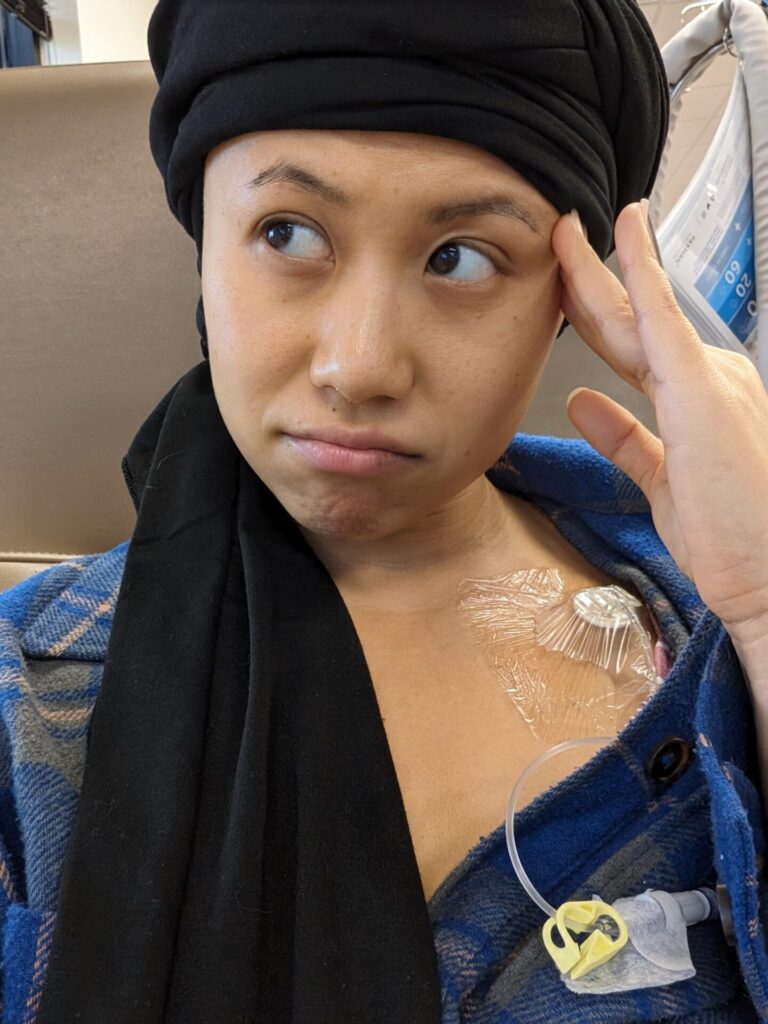
Treatment plan
After the doctor told me about my ovarian cancer diagnosis, she gave me a treatment plan.
So I was going to be having three rounds of chemo, surgery to take everything out, and then three rounds again.
So the midway point for the surgery, they just wanted to get the chemo in me first, but because I already would have had three rounds of chemo by then, they might not be able to really biopsy enough. There might not be enough cancer cells there for them to find out what is really going on.
IVF
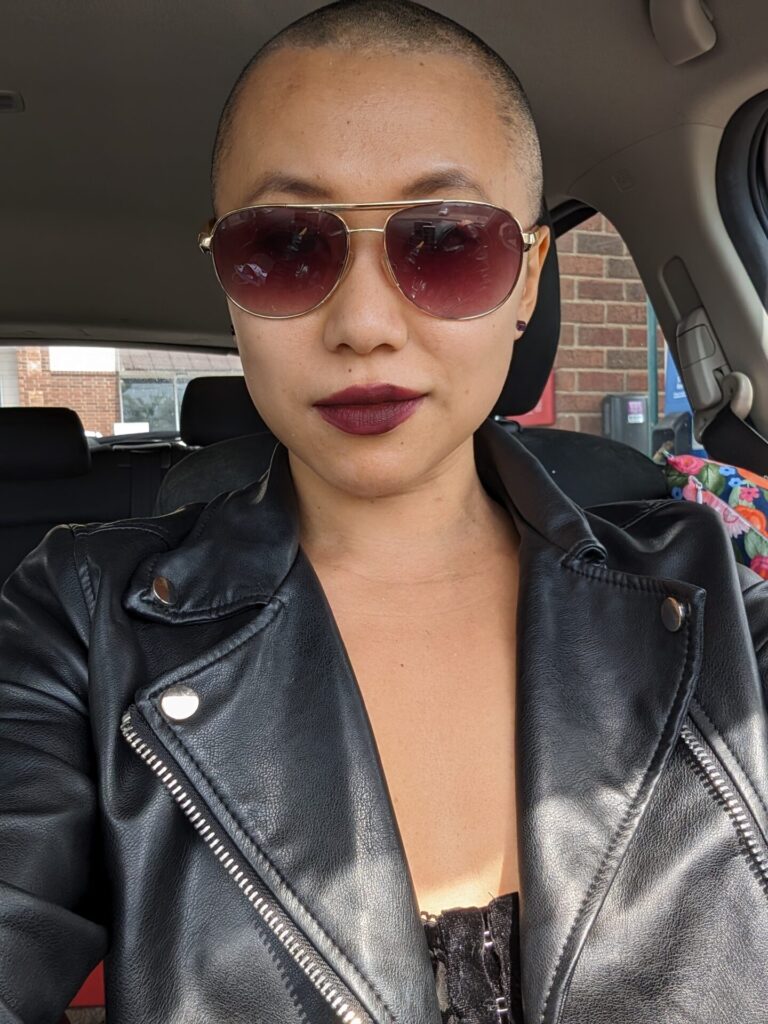
About a week after the report and discussing it with her, I started my IVF cycle, so I started freezing my embryos.
That wasn’t fun. It was a lot of injections, doctor’s appointments., and going back and forth, trying to get a discount.
My insurance didn’t cover the IVF cycle, so I had to look into different organizations that would provide discounts on the clinic. And there are discounts for cancer patients, I think in most clinics, at least mine did. And I was able to get help from Livestrong and the Heart Beat program with Walgreens.
The Heart Beat program basically gave me all the medication for free, which was really helpful because the medication itself, it’s like $10,000. And then the Livestrong also helped with the medication as well. It was like a 20% discount on certain things through the clinic.
I think we were fortunate in a sense, because I know a lot of women, they have to go through multiple cycles to freeze 1 or 2 embryos. We were lucky in a sense that we only had 1 shot, just 1 cycle before chemo started. We were able to freeze 8 embryos, which was amazing.
The clinic helped. They were the ones who told me about Livestrong. And they were the ones who applied on my behalf for the Walgreens Heart Beat program.
I think the complicated part, at least with my clinic, it was more like I wasn’t really sure who should be doing what part of the application process. It might have just been a clinic issue, but they weren’t very clear on who is starting? Am I the one applying directly or are they doing it on my behalf? So I had to do a little bit of work in that regards. But ultimately they were the ones who found the programs.
My doctor was the one who referred me to this clinic, so it seemed like she already had a relationship with the reproductive endocrinologist. So before I even went on my consultation, she already knew what was going on.
In terms of figuring out financially, I think we were fortunate in a way, because we had saved up for a trip and so we already had that nest there. If it wasn’t going to cost like that, we would have just done it anyways.
My husband and I, this has been a lot of discussion between like having kids or not. He’s the one that really wanted the kids. I was more like, could be maybe. Maybe not. It was just like, okay, might as well do this because if we don’t do it, we might regret it later.
This is a little bit morbid. If I, you know, pass away in 2 years, I felt at least I left something for my husband—a part of me there for him.
So, the IVF process. The first appointment was just discussing the different options. So I had the option of just freezing the eggs or embryos. But you still have to go through the IVF process. It essentially means they’re just taking the eggs out, the embryo part comes later.
During the process, they would monitor your follicles to see how they’re growing. Usually they want you to start, I think, like day 1 or 2 of your period. Um, I didn’t. I was on a timeline, so it didn’t pertain to me But I also luckily had my period the first day I saw her. So it kind of worked out in that sense.
So the first appointment, the doctor would check to see how many eggs are already there. In a way it was fortunate I had PCOS, so I had extra eggs. Apparently, if you have PCOS, it’s better for the process because you have more eggs.
Once she thinks you’re ready, you will start doing your injections. I did two medications, on my abdomen. The first injection was just so scary because you guess your spouse or someone could help you, but I just did it on my own. The medication helps grow the follicles.
I only had one ovary to do this, for others they might have two. But for my one ovary, she saw like 18 or something on there already. So they’re trying to grow everything at the same time essentially with the medication, but they don’t want you to grow it so fast, your ovary will get too big and then you will get hyper stimulating ovaries, which will cause a lot of pain.
They want to monitor you, every other day or so with blood work to check your estrogen level and also ultrasound. So I had to go to the clinic every other day. They gave me a different medication to start, to kind of balance it out so it doesn’t overgrow.
And then after about ten days, they decided that it was time for the trigger shot. They’re checking the size of each follicle. They want them all to be as big as possible. I think I had three that were like 20mm or something, I can’t remember. And that was when they decided it was time.
So then I did the trigger shot, and then the day after, they did the egg retrieval. During egg retrieval, they put me under, and then the process took like ten minutes.
And then they woke me up and they were like, we took out 22 eggs or something.
Treatment
Chemotherapy: Carboplatin and Taxol
Right after, a week after IVF, I started chemotherapy to deal with my ovarian cancer.
I got a week break between IVF and the chemo cycle. And I went back to Jersey for a wedding.
Okay, so the chemo regimen I’m on, it’s carboplatin and taxol. My chemo regimen is every 3 weeks. I would say it’s only bad the first week, and then it’s pretty much back to normal the next two weeks.
I did so much research before, I feel like I already knew everything before I started. And also, before chemo, they did like a chemo teach where I met with one of the physician’s assistants and they gave me a binder of information. So I already had an idea of what to expect.
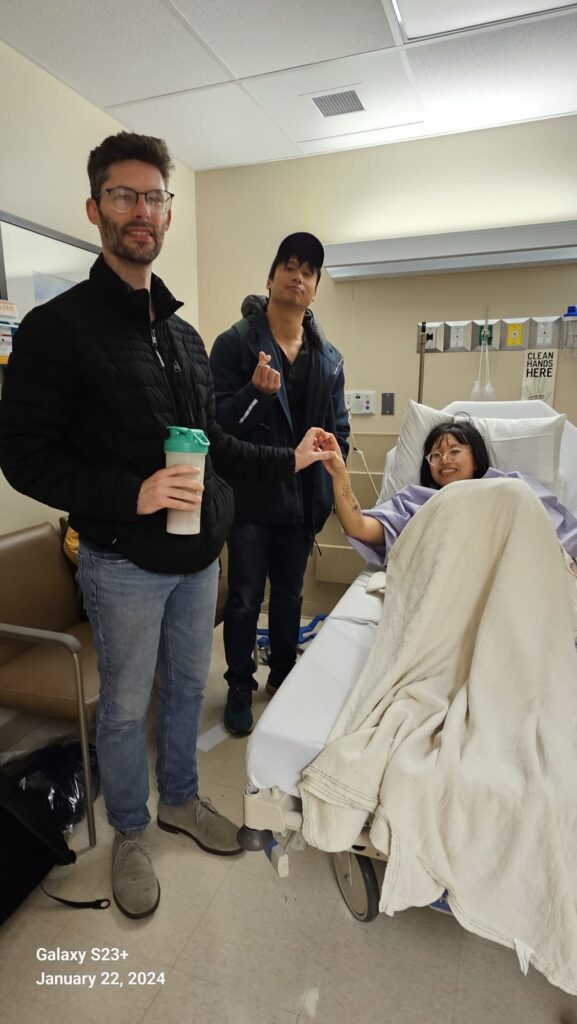
Side effects
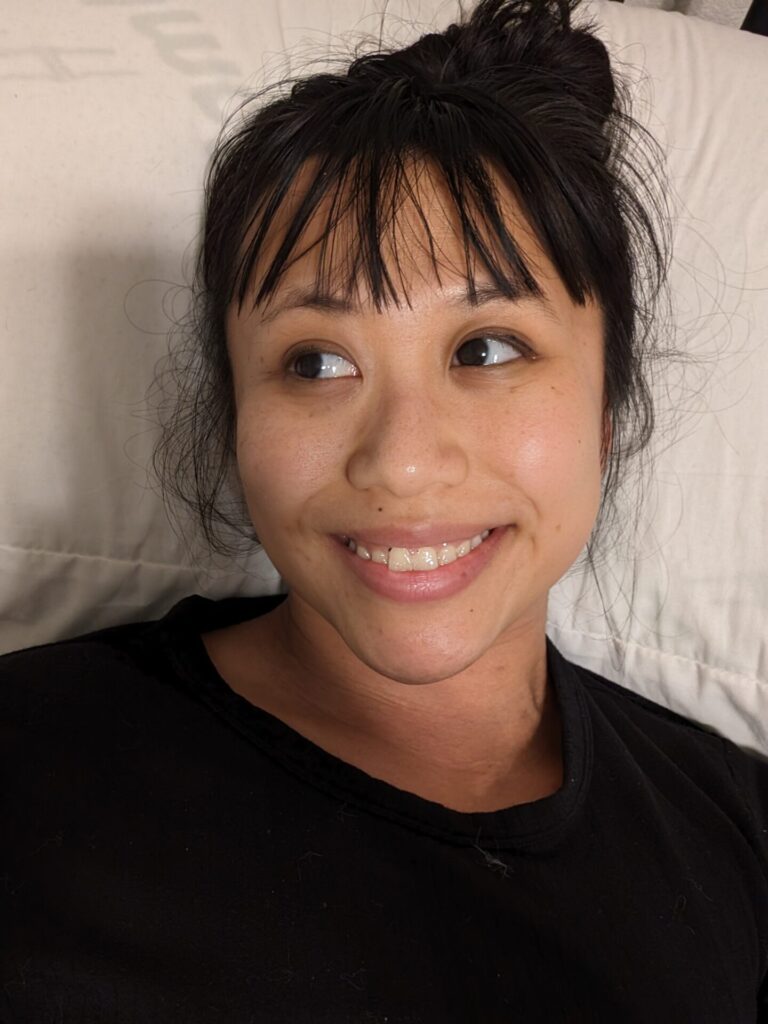
In terms of side effects, I think the major one is the hair loss. That pretty much happened after cycle 1 and throughout cycle 2 as well. But I think after cycle 1, I was just so anxious, I was like, I’m going to shave it off anyways. Just get it over with.
When I was reading online, I wanted to know when my hair loss would start. And most people said it would start about the second week. So I thought, I wish I knew that because I remember after the first, for like a week, I was just obsessive about my hair.
I would wake up and be like, are you going? Are you leaving me yet? And then when it was still here, I was like, oh my gosh, maybe I’m one of those lucky people. I wish I would have known that it really would start like after the second week.
I was never too attached to my hair. Or at least I thought so. Some women love their hair and they want it to look a certain way. I guess if I cut it and it’s ugly, I didn’t care too much, would be upset for a minute, and then I’d be like, okay, it’s gonna grow back. You’ll be fine.
When my hair started falling off, when I started seeing strands of hair on my pillow, It was just horrific to see that much hair coming out. I did get a little bit emotional. I think because I didn’t have that much time to process everything. Just seeing the hair kind of hit me in the face a little bit.
And then I felt really concerned about how I looked like without hair. I wasn’t sure if I would still feel attractive or if my husband was still find me attractive.
Ultimately, when I shaved my hair off, I was I was kind of surprised that, I thought, I still look good without the hair. I went on a lot of shopping sprees, just for new styles and wigs and makeup stuff. So I think that kind of helped.
Right now, I have days where I’m like, I really miss my hair. Especially like when I go out and I see people with beautiful hair, I’m like, oh, I really miss having hair.
But then most of the other days I’m just like, oh, how would this look on me now? I feel like I get to play a little bit with a different style. And then sometimes I’m also kind of like, I wonder what style is going to stick after this is over. Maybe I’ll adopt some of these new things.
So other side effects have mostly been swollen hands. I’m also having a slight neuropathy, only on my index finger. Very strange. And then a little bit of brain fog, but that tends to fade away after the first week.
Surgery: total hysterectomy
So my next milestone in my ovarian cancer journey, I guess, is my surgery. That’s coming up on May 20th. I get 4 weeks in between surgery and chemo, which means I get an extra week to play.
So the surgery I’m getting will be a total hysterectomy. They’re going to be taking out my remaining ovary, my uterus, the fallopian tube that attaches to the ovary, and my cervix as well.
I am incredibly anxious about it, because once they take out that ovary, that puts me in surgical menopause. And for women that are in forced menopause, I’m high-risk later on for osteoporosis as well as heart disease.
Not to mention, I’ve been reading a lot of other women’s experiences that are around my age, mostly breast cancer survivors. It sounds like there’s like a thing called vaginal atrophy that will happen or might happen as well.
Also, all the other stuff that comes with menopause, like hot flashes. I’m very, very scared just about what might happen.
Also they say that sometimes you don’t get those symptoms right away. So it’s not like I’m gonna wake up and it happens. It might take a few weeks before it happens.
They haven’t really talked to me about post-surgery. I just know I get a 4-week break and then I go back for chemo, but I do believe it’s the same chemo.
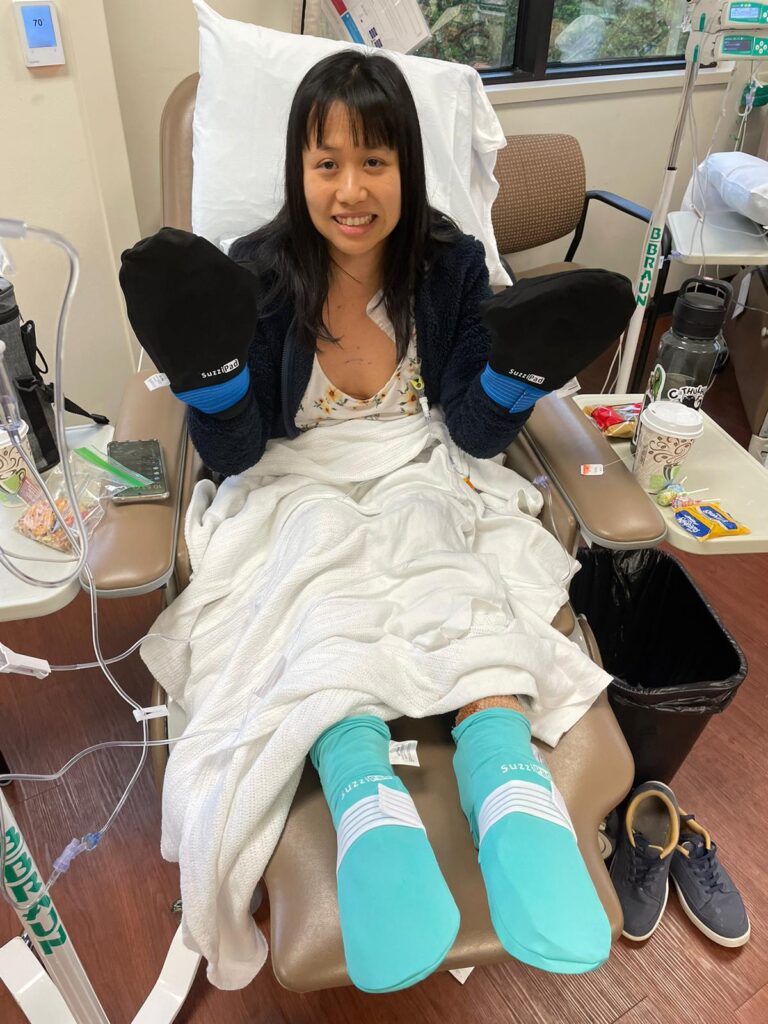
… don’t brush away that little voice that’s telling you something is probably wrong.
Shifts and learnings
Support
I felt like because of my ovarian cancer situation, everyone was extra nice to me. I would say I’m very fortunate, because everyone is being so supportive.
My mom lives in Jersey and flies here every cycle to help me out, and my husband has been very supportive, too. My friends like giving me rides and everything, too.
I think it’s going pretty well for what it is.
Realizations
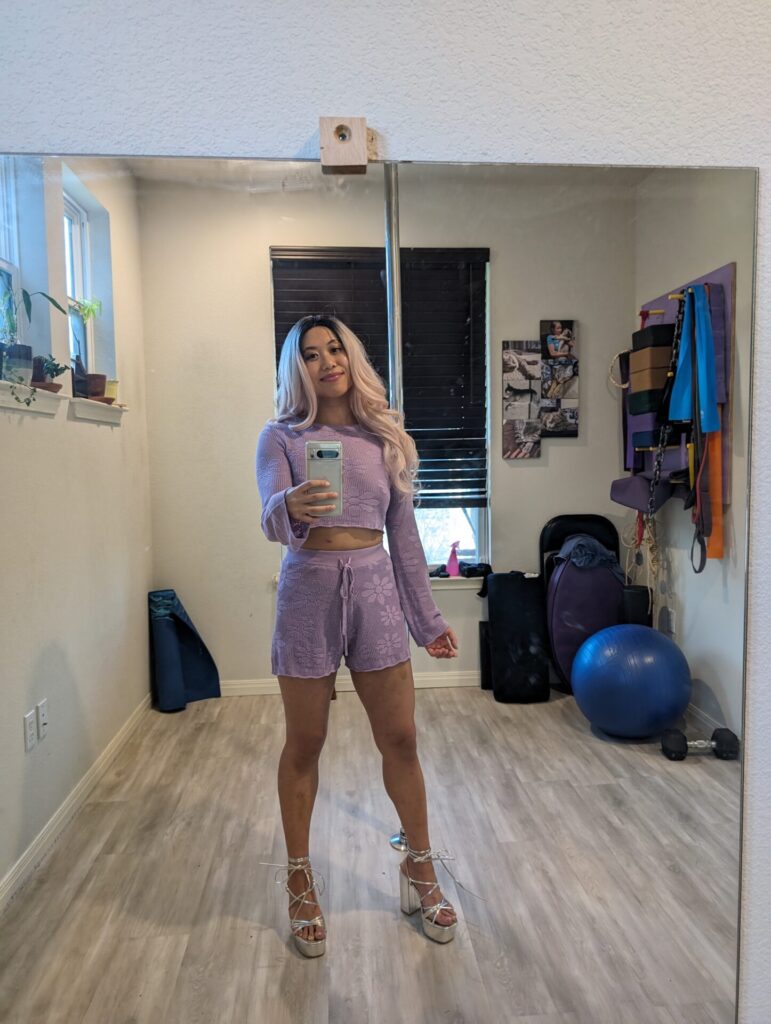
So when I look back, I do feel like I had the symptoms of ovarian cancer, I definitely ignored them. I do crazy workouts, so, yeah, I’m going to be like, there’s some tightness there or I just kind of brushed it off. but when I look back, I was kind of in pain.
I was remembering how there were days after I trained and I would be like, wow. Training really hurt today. And I really don’t want to do this post because it’s putting a lot of pressure in my abdomen and it’s really pretty uncomfortable. But I just brushed it away.
And so I think that if I did not get that IUD, I think it would have gotten me eventually, Because I’m young and healthy. I didn’t think of it as anything. I mean, I didn’t really bring it to the doctor or anything, but even, like, with the whole IUD thing, I felt like I had to really push for them to, take a look at it. And so, it is very important, don’t brush away that little voice that’s telling you something is probably wrong.
I think it’s mostly realizing, this sucks, but I still get to do so much cool stuff later on. Hopefully.
It sucks that I didn’t get to travel, but after this, maybe I can I can travel again, but it’s gonna look a little bit different than I planned because I’m not going to be able to just leave for a year now because of all the monitoring that they do. Kind of realizing that I’m still going to be able to see everything.
But I honestly think what has really gotten me through this is just me on the pole. Because I’m still able to pole dance, and contort, which I don’t understand how sometimes. So that has been pretty incredible, very helpful as well. Like for my mental health, too.
But I think what shifted in the way I’m thinking about it is to just appreciate what I can do, versus going after certain things and being frustrated with it. So I kind of see it in like a new perspective. Oh, I just took a class, and then I never looked back. Yeah.
Pole dancing is like a challenge. I love it because as long as you put the work or the training, the time into it, you will see results. And it’s like a way to express yourself in whatever way you want it to be.
So it doesn’t have to be sexy. It could be like emotional. It could be very athletic or just like, whatever you want. And I really love it for the art form and also for the physical challenge. And also the pole community is incredible. I made so many friends off of it, and it’s just a great place.
Advice
My biggest advice from everything that I’ve learned in my ovarian cancer journey is to be really honest with yourself first. Like, really checking in, are you feeling something or not? Even if the doctor thinks you’re being a little too much, just push them to do something because you never know.
And then really do your research before going to the doctor, because, hopefully you have a good doctor, but, if you don’t, you have the knowledge to back up what you are suspecting. And then be very assertive as to what you’re asking them for.
I would say something like, hey, I have a concern with this. Can we do a scan or something, instead of having them lead the way? You kind of want to almost lead the conversation instead.
And then also be honest with them as to what you’re feeling, too, because I think sometimes people brush away symptoms because they’re scared of what it could be. It’s better to know what it is and deal with it earlier versus later.

Inspired by Tiffany's story?
Share your story, too!
Related Cancer Stories
More Ovarian Cancer Stories
Cheyann S., Low-Grade Serous Carcinoma, Stage 4B
Cancer details: Makes up approximately 10% of cases of serous ovarian cancer.
1st Symptoms: Stomach pain, constipation, lump on right side above pubic area
Treatments: Cancer debulking surgery, chemotherapy (Carboplatin & Taxol, then Doxil & Avastin)
...
Susan R., High-Grade, Metastatic
Cancer details:Account for up to 70% of cases
1st Symptoms:Pulling sensation when emptying bladder; abdominal pain
Treatment: Chemotherapy (Carboplatin & Paclitaxel) & surgery
...
Jodi S., Epithelial Ovarian Cancer, Stage 4 (IV)
Cancer Details: Metastatic
1st Symptoms: Extreme bloating, extremely tight skin, changes in digestive tract, significant pelvic pain, sharp-shooting pains down inner thighs, extreme fatigue
Treatment: 4 rounds of chemotherapy, hysterectomy, 3 rounds of additional chemotherapy
...
